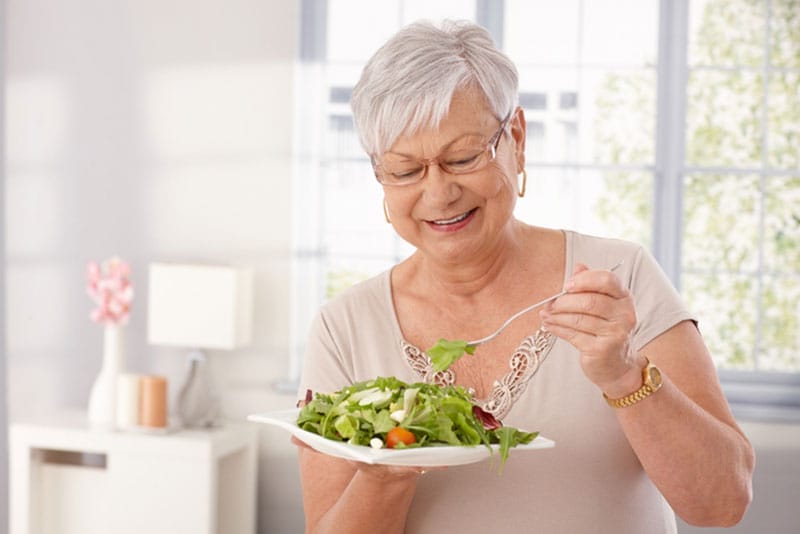The arrival of March marks the beginning of National Nutrition Month—a perfect time to delve into the unique challenges faced by older adults when it comes to maintaining a healthy diet. As people age, nutritional needs evolve, and various factors can impede the ability to access and consume nutritious foods. Identifying these senior nutritional hurdles and finding strategies to overcome them are crucial to ensuring that the older adults you love stay healthy.
What Foods Are Recommended for Older Adults?
As we age, our bodies undergo changes that require adjustments in dietary habits. For older adults, it’s essential to focus on nutrient-dense foods that support overall health and well-being. Here are some recommended foods for individuals aged 65 and over:
- Lean Proteins: Lean proteins such as poultry, fish, tofu, beans, and lentils help older adults maintain muscle mass and support tissue repair.
- Colorful Fruits and Vegetables: Colorful fruits and vegetables are rich in vitamins, minerals, and antioxidants that are vital for aging bodies. These include berries, leafy greens, oranges, and tomatoes, which promote heart health and aid in digestion.
- Whole Grains: Whole grains such as brown rice, quinoa, oats, and whole-grain bread boost fiber intake, regulate blood sugar levels, and support digestive health.
- Healthy Fats: Healthy fats such as avocados, nuts, seeds, and olive oil support brain function, reduce inflammation, and maintain skin health.
- Dairy or Alternatives: Low-fat dairy products or fortified alternatives like almond milk and soy milk help to ensure adequate calcium intake for bone health.
What Are Some Common Senior Nutritional Hurdles?
Despite the importance of a healthy diet, older adults often face significant barriers that hinder their ability to access and consume nutritious foods:
- Living in Food Deserts: Many older adults reside in areas with limited access to grocery stores and fresh produce, making it a challenge to obtain healthy food options.
- Mobility Issues: Physical limitations, mobility impairments, or an inability to drive can make it difficult for older adults to travel to grocery stores or farmers’ markets to purchase groceries.
- Cognitive Decline: Cognitive issues such as dementia or Alzheimer’s disease can affect a person’s ability to plan, prepare, and remember meals, leading to poor dietary choices or skipped meals.
- Medications and Illnesses: Certain medications can decrease appetite or even change the taste of food, which can make it more challenging for older adults to eat properly. Some chronic illnesses can also cause nausea, digestive issues, or even make it painful to prepare food, which can decrease a person’s desire to cook or eat.
- Loneliness and depression: The joy of cooking and mealtime often comes from sharing that time with others. When a person is living on their own, feelings of loneliness or depression can reduce the enjoyment of food and lead to a decrease in eating.
Tips for Family Caregivers
Family caregivers play a vital role in supporting the nutritional needs of older adults. Following are some practical tips to help overcome these challenges:
- Meal Planning and Preparation: Help older adults plan and prepare nutritious meals that align with their dietary preferences and restrictions. Consider preparing meals in bulk and freezing portions for convenience.
- Grocery Shopping Assistance: Accompany older adults on grocery shopping trips or explore grocery delivery services to ensure they have access to fresh and healthy food options. Additionally, help older adults create grocery lists and prioritize essential items.
- Encourage Social Dining: Encourage older adults to participate in social dining programs or community meal services where they can enjoy nutritious meals in a social setting, reducing feelings of isolation and promoting overall well-being. Or plan a regular dinner party with close friends and family to create a more enjoyable mealtime experience.
- Simplify Mealtime: Streamline mealtime by providing pre-cut fruits and vegetables, easy-to-open packaging, and utensils adapted to their needs. Consider using meal delivery services or pre-packaged healthy meals for added convenience.
- Monitor Nutritional Intake: Keep track of older adults’ nutritional intake and address any concerns or deficiencies by consulting with healthcare professionals or registered dietitians. Consider incorporating supplements if necessary.
Addressing common senior nutritional hurdles and implementing practical strategies can enhance the overall quality of life for older adults. Additionally, in-home care services, like those offered by the award-winning team at Jewish Family Home Care, can help. Our RN-supervised caregivers can plan and prepare healthy meals in accordance with a person’s dietary needs and even share meals to make mealtime more enjoyable. To learn more about how our team can help an older adult you love overcome nutritional obstacles, contact us online today or give us a call at 954-908-5677.
Jewish Family Home Care is a non-profit home care agency serving people of all faiths in Pembroke Pines, Tamarac, Hollywood, and all of Broward County.
